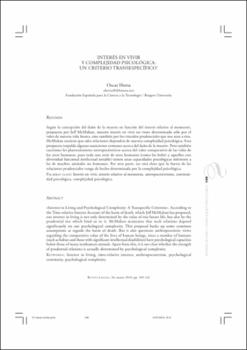Interés en vivir y complejidad psicológica: un criterio transespecífico
Autor
Horta, OscarFecha
2010Resumen
Según la concepción del daño de la muerte en función del interés relativo al momento, propuesta por Jeff McMahan, nuestro interés en vivir no viene determinado sólo por el valor de nuestra vida futura, sino también por los vínculos prudenciales que nos atan a ésta. McMahan sostiene que tales relaciones dependen de nuestra complejidad psicológica. Esta propuesta respalda algunas asunciones comunes acerca del daño de la muerte. Pero también cuestiona los planteamientos antropocéntricos acerca del valor comparativo de las vidas de
los seres humanos, pues toda una serie de seres humanos (como los bebés y aquellos con diversidad funcional intelectual notable) tienen unas capacidades psicológicas inferiores a las de muchos animales no humanos. Por otra parte, no está claro que la fuerza de las relaciones prudenciales venga de hecho determinada por la complejidad psicológica. According to
the Time-relative Interest Account of the harm of death, which Jeff McMahan has proposed,
our interest in living is not only determined by the value of our future life, but also by the
prudential ties which bind us to it. McMahan maintains that such relations depend
significantly on our psychological complexity. This proposal backs up some common
assumptions as regards the harm of death. But it also questions anthropocentric views
regarding the comparative value of the lives of human beings, since a number of humans
(such as babies and those with significant intellectual disabilities) have psychological capacities
below those of many nonhuman animals. Apart from this, it is not clear whether the strength
of prudential relations is actually determined by psychological complexity




